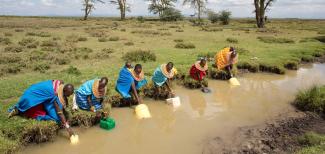Gender relations
Domestic helpers are informally employed in many countries

People strive to satisfy various physical and psychological needs. Food, shelter and clothing are fundamental requirements, and so are rest, leisure and participation in social life. Entertainment and hobbies are important too. A good life requires an adequate balance between time spent in work and non-work activities.
Today, the eight-hour workday is considered to be normal for formally employed people, not only, but especially in high-income countries. Typically, they earn enough money to make ends meet. Things look different for those working in irregular employment or the informal sector. If working eight hours for five days per week does not suffice to fulfil their basic physical needs, they will have to work more and suffer what is called “time poverty”.
Time poverty in this sense must not be confused with opting to work hard to advance in a promising career. Achieving a position of leadership or substantial wealth may be desirable, but it is, by definition, not a basic need. Quite obviously, there can be enough food for everyone, but not everyone can be a team leader.
Time poverty is closely related to income poverty. Informal businesses, smallholder farms and subsistence agriculture are marked by both. Given that productivity is low, incomes tend to be very low too. Vacations and holidays are exceptions, not the norm. Labour legislation does not apply – or is not enforced.
It matters, of course, that many children do considerable work on family farms and family businesses. They too suffer time poverty – often with harsh impacts on their school careers. For reasons that will be spelled out below, girls are affected in particular. Education, however, is crucial for building skills and self-confidence. Graduating from school is thus indispensable for female empowerment (see my essay on www.dandc.eu).
Women’s plight
Like income poverty, time poverty is indeed gendered. Women are much more likely than men to experience it. An important reason is that traditional gender roles assign a disproportionate burden of domestic work to women. As work in the informal sector, it is not formally regulated and it is considered to be a personal affair of little public relevance.
Common terms for this work are “reproductive labour”, “home production” or “unpaid care and domestic work” (UCDW). The activities include:
- procuring and preparing food,
- taking care of children as well as elderly and ill relatives,
- cleaning the home and washing clothes and
- in poor households of developing countries and emerging markets, fetching water and firewood.
Recent research (Charmes, 2019) showed that, around the world, over two-thirds of the unpaid care work is done by women. In many countries, especially in the global south, the share is considerably higher. The same study indicated that the more the hours a woman spends doing unpaid care work, the less time she has for earning money.
Poor infrastructure makes matters worse, for instance when a household is not connected to water pipes. The farther a woman must go to fetch water, the more time constrained she becomes. If her home lacks electric power and she cannot rely on gas cannisters either, she will need additional time to collect fuelwood. To live in an informal settlement, therefore, means more time poverty, especially for women.
There are important economic and development implications. Having to spend long hours on low-productivity tasks reduces a person’s overall productivity. If it takes a woman an hour to fetch water, for example, she has an hour less for engaging in income generating work. Both in rural areas and unplanned urban settlements, that work will most likely be in a labour-intensive informal business with low remuneration.
To some degree, growing prosperity allows households to purchase vacuum cleaners, washing machines, dish washers and other labour-reducing machines. Technologies of this kind have helped women in the prosperous nations to participate in paid formal work.
However, there are rebound effects too. The availability of helpful tools has raised expectations. For example, people change into clean clothes more often than they did before the advent of the washing machine. Rebound effects, of course, mean more household work.
Exploited maids
In developing countries, by contrast, prosperous households tend to rely more on paid domestic helpers than household machinery. The women concerned typically do not have formal employment contracts, but they are expected to work very long hours. It is not uncommon for them to be expected to prepare breakfast in the morning and not leave before they have cleaned the dinner dishes. Some underage girls do this kind of time-consuming work too.
The incomes of domestic servants are low and they have very little personal autonomy. They are typically uneducated, and some have migrated from rural areas to urban ones, or even gone abroad (see, for example, Mona Naggar on www.dandc.eu). Many of the women concerned are not in touch with their families and lack any kind of protection. Sexual abuse happens all too often. During the Covid-19 pandemic, however, many suddenly lost their jobs and fell into desperate financial poverty.
To a certain degree, this kind of informal work is actually quite common in high-income countries. In Germany for example, even middle-class households often hire undocumented immigrants from Eastern Europe, for example, to do the cleaning. The women concerned normally do not have a written contract, do not get paid vacations as most employees do and do not benefit from Germany’s various social-protection schemes. Many of them live in constant fear of being found out, so they do not dare to go to the police even when people cheat or otherwise abuse them.
Health, education, skills, nutrition
Time poverty is not only a matter of inadequate rest and relaxation. It affects families’ lives. Time-constrained women in developing countries often depend on the support of their children, especially the daughters, to fulfil their household chores. Adolescent girls are then expected to look after younger siblings. Masses of them drop out of school before graduating.
Boys and girls may similarly be tasked with the collection of water and fuelwood. That too affects the time they have for attending school and doing schoolwork.
In a more fundamental sense, children’s welfare and development depend on the attention they get from their parents. Due to traditional gender roles, mothers are expected to rise to these responsibilities. Women experiencing time poverty may be unable to prepare healthy, nutritious and diverse diets for their children. Financial poverty, of course, exacerbates the problem. Obviously, hygiene and especially the sanitation situation matter too. If women are unable to maintain an adequate standard, children may suffer from repeated incidences of diarrhoea, worms or other diseases that affect their nutrition and physical and cognitive development.
No data, no problem?
There is a dearth of robust empirical research quantifying the potential impacts of women’s time constraints on their children’s prospects. There are many reasons behind the scarcity of empirical evidence. A core problem is that unregulated and unregistered activities in general remain undocumented almost by definition. Even prosperous nations with highly-developed statistical systems have no trustworthy data on how many illegal immigrants do how much domestic work for what meagre pay in private households.
It is a fallacy to believe that there is no serious problem simply because the problem does not show up in statistics. There is a case for doing more research as well as for investing in technologies and services that reduce women’s time burdens in developing countries and emerging markets. Prudent regulation and law enforcement would help too – not least in terms of changing deeply entrenched attitudes regarding gender roles.
Reference
Charmes, J. (2019). The unpaid care work and the labour market. ILO, Geneva.
Sundus Saleemi is a senior researcher at the Center for Development Research (ZEF) of Bonn University.
sundus.saleemi@gmail.com













